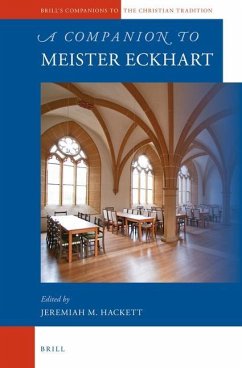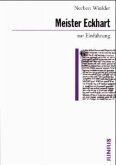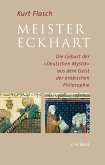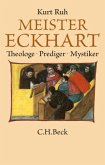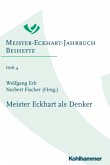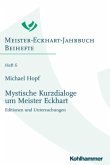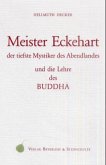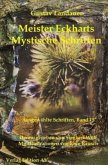This book meets an obvious need in English language studies on Meister Eckhart. It is the first handbook on Eckhart for graduate and undergraduate students. It is divided into three parts. Part one deals with the life, works, career, and trial; Greek, Jewish, and Arabic philosophical sources, and some central philosophical ideas. Part two examines Eckhart as a Latin exegete, vernacular preacher, Eckhart's understanding of God, Eckhart as a reader of Maimonides and in relation to women's spirituality. Part three deals with the reception of Eckhart and his works from the fourteenth century to the twenty-first century. It covers fourteenth-century German readers of Eckhart, the fifteenth-century reader Nicholas of Cusa, the sixteenth-seventeenth-century reader Valentine Weigel, the reception of Eckhart in German idealism and romanticism and Eckhart and philosophy in the twentieth century. There is an epilogue on mysticism and philosophy in Eckhart and an appendix on Dominican education in the Middle Ages.
Contributors include Walter Senner OP, Allesandra Beccarisi, Dagmar Gottschall, Loris Sturlese, Tamar Tsopurashvili, Jennifer Hart Weed, Jeremiah Hackett, Udo Kern, Alessandro Palazzo, Eliza Rubino, Donald F. Duclow, Bruce Millem, Markus Enders, Yossef Schwartz, Lydia Wegener, Jack C. Marler, Nadia Bray, Elizabeth Brient, Fiorella Rettucci, Andrew Weeks, Cyril O'Regan, Dermot Moran, Karl Albert and Paul Dietrich
Contributors include Walter Senner OP, Allesandra Beccarisi, Dagmar Gottschall, Loris Sturlese, Tamar Tsopurashvili, Jennifer Hart Weed, Jeremiah Hackett, Udo Kern, Alessandro Palazzo, Eliza Rubino, Donald F. Duclow, Bruce Millem, Markus Enders, Yossef Schwartz, Lydia Wegener, Jack C. Marler, Nadia Bray, Elizabeth Brient, Fiorella Rettucci, Andrew Weeks, Cyril O'Regan, Dermot Moran, Karl Albert and Paul Dietrich
"Hackett's work is a valuable contribution to the field of late medieval theology and will certainly serve as an excellent reference book for those studying the work of Meister Eckhart."
Anik Laferrière, Keble College, Oxford. In: The Journal of Ecclesiastical History, Vol. 65, No. 2 (April 2014), pp. 409-411.
''This hefty tome proves to be the first comprehensive introductory work on Meister Eckhart, the famous German theologian [...] magisterially and beautifully edited by Jeremiah M. Hackett, it convincingly emerges as a major contribution to current research on and teaching of Meister Eckhart [...] the editor and the contributors lay the foundation for future Eckhart research by way of addressing many of the critical issues in this author´s life and works''.
Albrecht Classen, University of Arizona. In: Sixteenth Century Journal, 44, No. 4, 2013, p. 1080.
''In this substantial volume, Jeremiah M. Hackett and a host of international experts on the life, writings, and reception of the German Dominican preacher and theologian Meister Eckhart (ca. 1250-1327) provide an invaluable service to students and scholars of Eckhart and of late medieval theology, philosophy, and mysticism[...] It is impossible to do justice to a volume of this magnitude in a brief review''.
Amy Hollywood, Harvard University. In: Renaissance Quarterly, Vol. 67, No. 1, Spring 2014, pp. 282-283.
Anik Laferrière, Keble College, Oxford. In: The Journal of Ecclesiastical History, Vol. 65, No. 2 (April 2014), pp. 409-411.
''This hefty tome proves to be the first comprehensive introductory work on Meister Eckhart, the famous German theologian [...] magisterially and beautifully edited by Jeremiah M. Hackett, it convincingly emerges as a major contribution to current research on and teaching of Meister Eckhart [...] the editor and the contributors lay the foundation for future Eckhart research by way of addressing many of the critical issues in this author´s life and works''.
Albrecht Classen, University of Arizona. In: Sixteenth Century Journal, 44, No. 4, 2013, p. 1080.
''In this substantial volume, Jeremiah M. Hackett and a host of international experts on the life, writings, and reception of the German Dominican preacher and theologian Meister Eckhart (ca. 1250-1327) provide an invaluable service to students and scholars of Eckhart and of late medieval theology, philosophy, and mysticism[...] It is impossible to do justice to a volume of this magnitude in a brief review''.
Amy Hollywood, Harvard University. In: Renaissance Quarterly, Vol. 67, No. 1, Spring 2014, pp. 282-283.

